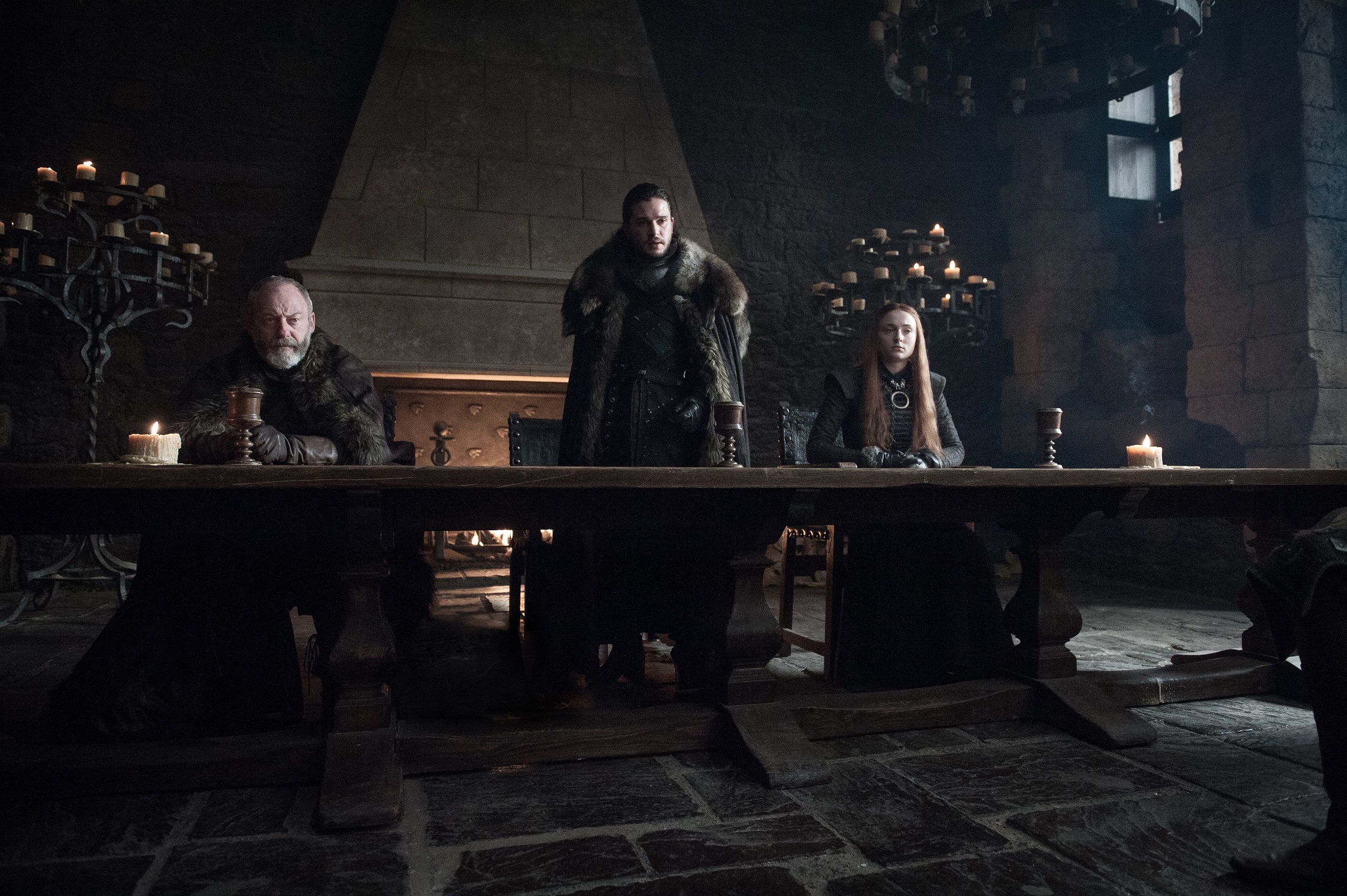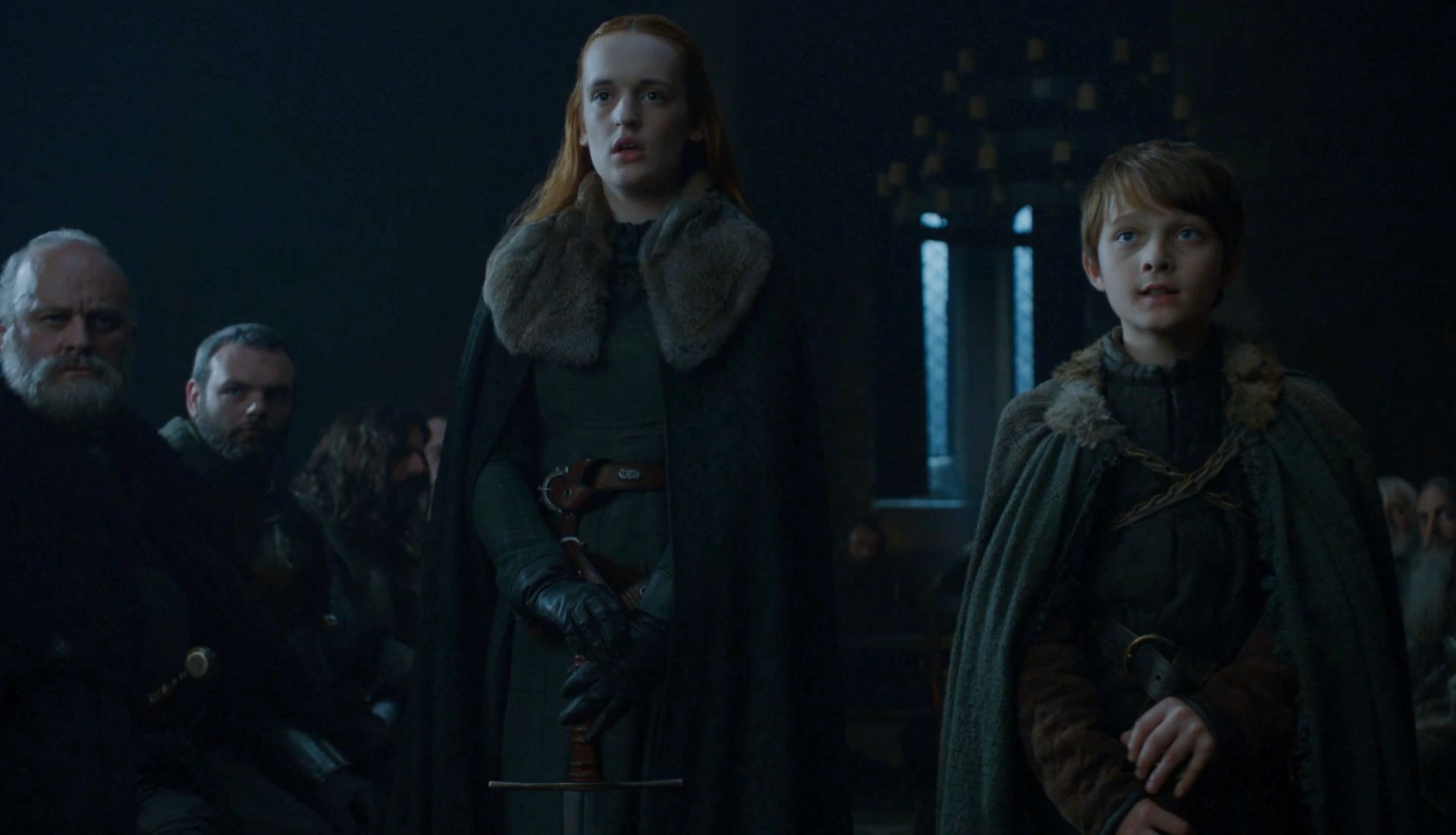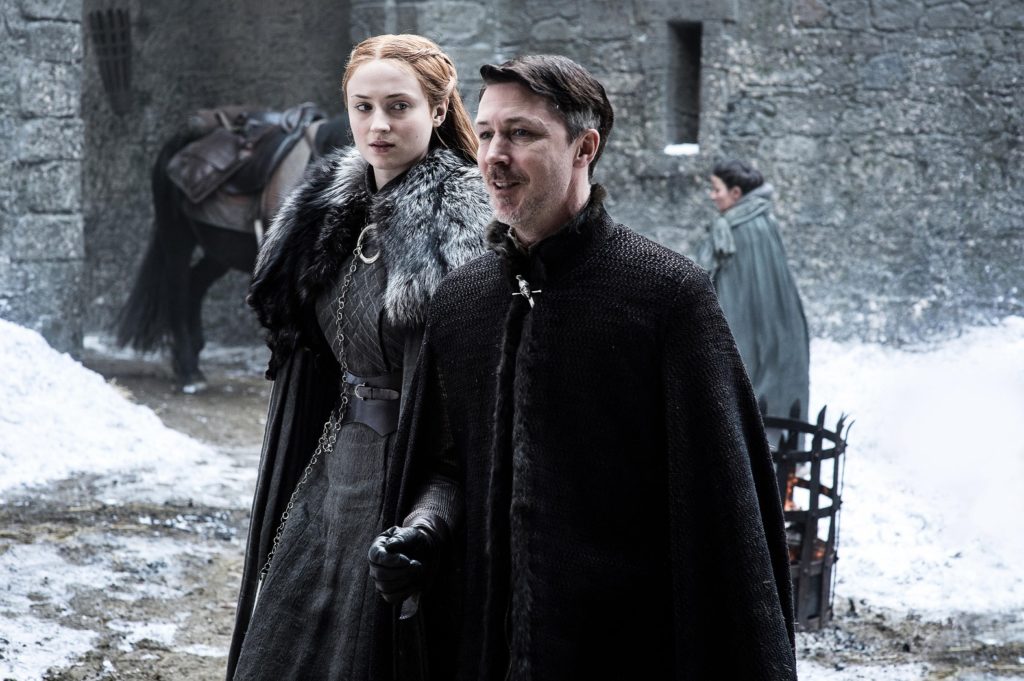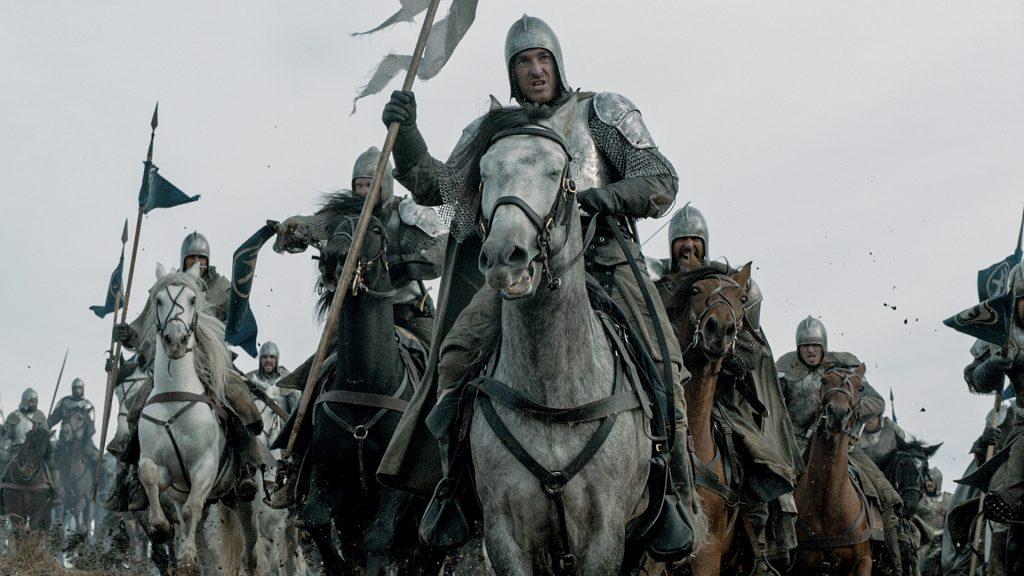So there’s no punishment for treason, and no reward for loyalty? — Sansa Stark
There’s a new Game of Thrones episode on the horizon (new to most of us who are avoiding details from the leaked episode that is) but rather than looking forward to the next episode “The Spoils of War” – let’s take a look back at the first episode of the season. And at Sansa Stark.
The show’s return to Winterfell featured King in the North Jon Snow laying out his agenda for the coming war against the Night King’s White Walkers and their walking-dead wights. Jon prioritized weapons development with dragonglass, and shoring up the defenses at the Wall with wildling volunteers to reinforce Eastwatch-by-the-Sea.
Jon knows the kind of threats posed by the army of the dead from his experience at Hardhome; the Wall alone might not suffice. The fear that the Wall could be bypassed led to the third item on Jon’s agenda: the utilization of the two most northern castles south of the Wall. Decisions needed to be made about Last Hearth of the Umbers, and Karhold of the Karstarks.
Jon and Sansa argued over the disposition of the castles. Sansa suggested that new families, loyal ones that fought for the Starks should be granted possession of these holdings, but Jon was willing to forgive the surviving children for the misdeeds of their now-dead elders and let them pledge fealty as a means of reconciliation.
Eventually, Jon ended the conversation by invoking his executive privilege and the relieved Alys Karstark and Ned Umber knelt before Jon and swore earnest oaths, to the acceptance of the witnessing northern lords.
It was a stirring scene when the little lord and lady pledged fealty, which gave some gravity and heft to Jon’s behavior as a righteous king, but seemingly at Sansa’s expense in the viewers’ eyes.
Was Sansa being needlessly cruel in wanting to punish the children of the Karstarks and Umbers? Or was she just being stupid as some might have alleged over the years (*cough* *cough* Cersei *cough*) in not recognizing that Jon’s plan for reconciliation sets aside the past squabbles of Summer to prepare for Winter? (And the big war that Winter will bring.)
Were we supposed to interpret Sansa’s contrarian views as a hint that she was going to oppose Jon this season or the next? There’s been some debate on this topic during the hiatus between seasons six and seven, based on the ambiguous glances that Sansa and Lord Baelish were giving each other when Jon was declared to be King in the North.
It’s not my place to tell people how to think, or how they should feel about any particular character. I’m also not interested in trying to guess what the motives the showrunners and the writers have when they bring these characters to life through their words and deeds. But I am interested in trying to guess at the character’s own thoughts and motivations.
This is a subjective issues, and your mileage may vary. None of us can know these characters’ thoughts from the show, unlike in the books when we get access to their perspectives, if not access to their full thoughts.
Ned: You can just stay out of my head. I made a promise.
Lyanna: Promise me Ned…
Ned: ThinkaboutsomethingelseThinkaboutsomethingelseNotaboutJon…
Me: Dude, we totally know.
Our inability to know a character’s thoughts is a good thing in my opinion. Ambiguity and doubt are a good thing. It’s what drives discussion and speculation. There is a benefit in doubt.
If I can list my own biases: I try to go in with the assumption that these characters are striving to make rational choices. But they are fallible humans and are going to behave emotionally or impulsively at times. They will make mistakes. This is especially true of characters who are so smart, they can rationalize poor decisions.
Applying this to Sansa Stark, here are my biases and assumptions:
- She’s not stupid.
- She’s not cruel.
- She does not harbor ill-will towards Jon.
From those assumptions, let’s return to the conflict with Jon about the castles of the Karstarks and Umbers.
Or rather, let’s quickly break off on a tangent and tackle a related topic: Sansa speaking her mind in court. (We’ll come back to my main examination in a moment.)
After the matter is resolved in court, Jon admonishes Sansa for speaking out against him. His complaint is that arguing with him undermines his authority. He’s sort of right. He’s sort of wrong.
To be fair, Sansa could have easily made this assertion after the meeting:
Sansa: Hey Jon, when I suggested that we grant the castles to loyal families, you really shouldn’t have contradicted me. It undermines my authority as Lady of Winterfell.
Lord Royce: Now see here, Lady Sansa! When I recommended that Last Hearth and Karhold be torn down, you contradicted me! You’re undermining my authority as a great Lord of the Vale.
Jon: Yeah. But that was a stupid idea.
Lord Royce: Well, I see that now. But I’m too sensitive a person to have my ideas challenged in public!
Sansa: You snowflake.
From a Vito Corleone point of view, Jon makes sense in that public squabbles undermine the message, but Sansa is the Lady of Winterfell. She has a right to voice her opinion, just like Lord Glover and Lady Mormont do when they challenge Jon’s plan to meet face-to-face (them’s some lovely faces) with Daenerys Targaryen.
Jon: I’m going to meet up with this dragon queen.
Lord Royce: Don’t! It’s a trap!
Lord Glover: I don’t think you should go, your grace.
Lady Mormont: I agree with Lord Glover.
Lord Glover: YOU DO? This is a new thing I’m experiencing.
Lady Mormont: Don’t get used to it.
Lady Sansa: I have an opinion on this matter, but literally no one wants me to voice it, so I’ll just sit here and be extraneous.
Let’s cut Sansa some slack on being in sync with Jon or not. She’s entitled to her opinion, and entitled to voice her opinion. Even when she’s wrong.
And I don’t think she’s necessarily wrong about Last Hearth and Karhold.
I approve of Jon’s action in granting amnesty to Alys Karstark and little Ned Umber, it’s the move I would have supported, but I think Sansa’s plan for the castles is based on her rational priorities and not on either cruelty or being too stupid to see the value in Jon’s judgment.
Jon is planning for a war against supernatural forces from beyond the Wall. Sansa is waging a smaller war closer to home, and it’s a war that she has to keep under the radar of her friends, family, and her enemy. That enemy is Littlefinger.
Brienne: Why is he still here?
Sansa: It’s so gross, I know, but we need him. Knights of the Vale, etc. Ugh.
The Knights of the Vale at Winterfell are probably the dominant military force on-site. Lord Royce is aligned sympathetically with House Stark, but Sansa probably senses the influence that Lord Baelish has with the knights. Baelish is technically the Lord Protector of the Vale as Lord Robin Arryn’s beloved step-father. (And Sansa already knows that Baelish tends to buy loyalty from men in critical positions.)
Sansa has to keep Baelish in check, since in a moment of treachery he could dramatically shift the balance of power in the North. In my opinion, Sansa is reluctant to tell Jon her fears about Littlefinger, either because he’ll discount them or force a confrontation with Baelish that will backfire. We’ve seen Lord Royce’s own men back Baelish over Royce at the beginning of Season Six. Sansa has cause to worry about Jon trying to take Baelish on out in the open.
It would probably be worse if Sansa confided in Jon, and expected him to keep things on the down-low.
Sansa: Okay, just play it cool, I’m working on ways to cut Littlefinger off from his power base. Don’t mess this up.
Jon: I can be cool. I’m the coolest. My last name is Snow, after all.
Sansa: That might be true, but it’s irrelevant.
Baelish: Ah, good day my lady, your grace.
Jon: WE WEREN’T TALKING ABOUT YOU OR ANYTHING!
Sansa knows that in most circumstances, honorable intentions work in the North. But not always. Jon is facing a very direct enemy up north. Littlefinger is short-sighted enough not to understand that, and has lived in a world where treachery is rewarded, and loyalty can be a liability.
So, what does this have to do with Karhold and Last Hearth? Sansa’s problem is that Littlefinger has a large military force at Winterfell, a force that doesn’t have any real political ties to her and Jon. Sansa’s stated plan for the castles was to use them as rewards for those who shed blood for the Starks.
Most of the North did not shed blood for the Starks. The bulk of Jon’s forces were the wildlings, and they can probably be trusted to man the castles at the Wall, but probably can’t be expected to administer large areas settled by northmen, especially those who traditionally have fought wildlings.
The heroes of the Battle of the Bastards would be the Vale cavalry. It seems logical that they should benefit from these rewards. Or at least it might not be suspicious to Littlefinger if Jon Snow granted them castles and land, something Sansa could use to the Stark advantage.
If Karhold and Last Hearth were granted to some of the leading knights (or maybe just the large holdfasts within those regions) there would be some advantages. These lords from the Vale would now owe actual fealty to the King in the North, in regards to being landholders, and would have something to lose if the Wall was breached. There would be a relationship with northern authority that did not flow through Littlefinger’s control.
The northerners in the Last Hearth and Karhold regions might not like having someone from the Vale put in place, but this is something that political marriages can smooth over. Marriages also set up a political dependency and affiliation that is outside of Littlefinger’s control.
These are the kinds of wranglings that Sansa would understand better than Jon, and would let her work to erode Littlefinger’s potential treachery by instilling an alternative authority in the knights from the Vale.
If we consider Sansa’s priorities in this light, it makes her follow-up conversation with Jon, about Ned and Robb making mistakes, something of more depth and import.
But isn’t it still a cruel thing for Sansa to evict the remaining Karstarks and Umbers? One of my assumptions with Sansa is that she isn’t cruel. How does this conform with her priorities?
To be fair, it seems doubtful that Alys Karstark and Ned Umber, along with any younger siblings, would be dropped out in a snow bank to freeze or starve. They’d be fostered with other northern families, with the possibility of one day outliving the dishonor incurred by their fathers.
We’ve seen fostering as a tool for building connections between families (Ned being fostered with Robert Baratheon in the home of Jon Arryn) and as the result of war (Balon Greyjoy’s yielding to Robert kicked off the fostering of Theon with the Starks.) The books have other examples of young lords growing up with the families of other lords, as a means to build up unity in the region.
This might not be what Alys or the young Umber might want, but it’s certainly better than what happened to the Reynes of Castamere.
Now, all of this is speculation based on a few short scenes, but from my perspective it satisfies what we want from Sansa. (Or what some of us want from Sansa.)
We want her to have learned some lessons during her past seasons of hard experience. We want her to have come through it better. We want her to take Littlefinger down a peg. We want this.
We don’t always get what we want. I’m cool with that. But until we do, I’m willing to give Sansa the benefit of the doubt, and enjoy the speculation that the ambiguities attached to Sansa and her unknown motivations can afford us.
The lone wolf dies, but the pack survives. — Sansa Stark
I think we can make some solid guesses in regards to her motivation.
The post The Widow of Winterfell and the Benefit of Doubt appeared first on Watchers on the Wall.
Via http://watchersonthewall.com






No comments:
Post a Comment